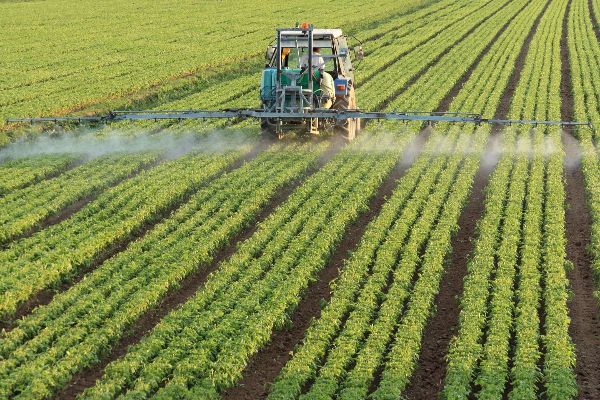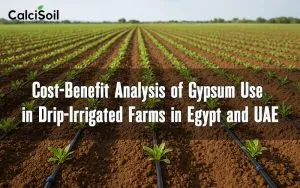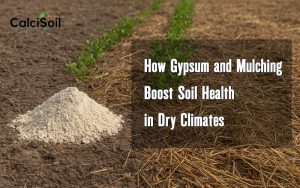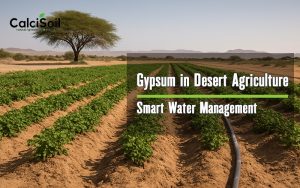
The amazing effects of gypsum on soil physical properties
Importance of Soil Physical Properties
Soil physical properties are crucial for achieving maximum crop yields. These properties include soil structure, porosity, density, and moisture retention, all of which significantly influence plant growth. If the soil lacks appropriate physical characteristics, the effectiveness of fertilizers and foliar nutrient sprays diminishes considerably.
Unfortunately, many farmers overlook the importance of soil physical properties and focus solely on applying fertilizers and chemical solutions to enhance crop yield. However, minor adjustments to these properties can greatly improve the efficiency of chemical fertilizers. One such amendment that has proven beneficial is agricultural gypsum, which plays a vital role in enhancing soil physical properties and consequently increasing crop yields.
How Agricultural Gypsum Amends Lime-Rich Soils
When applying agricultural gypsum, it is essential to consider various factors to determine the appropriate amount needed for different agronomic and horticultural crops. Research has shown that high lime content in soil raises its pH to around 8, making it challenging for plants to absorb essential nutrients such as phosphorus, calcium, and various micronutrients. Additionally, lime can form hard layers within the soil that obstruct root penetration.
The application of gypsum effectively reduces the pH of alkaline soils to a neutral level, which is more conducive to the growth and development of most crops. When gypsum is introduced into alkaline soils, it reacts with the lime present to form calcium carbonate and sulfuric acid. The sulfuric acid generated helps lower the soil’s pH to a more suitable range for plant growth.
Mechanisms of Gypsum’s Effect on Soil Properties
Agricultural gypsum (calcium sulfate) is recognized for its ability to improve both the physical and chemical properties of the soil. The benefits of gypsum application are particularly pronounced in clay-rich soils where it promotes the stabilization of soil structure through flocculation. This process enhances water infiltration and percolation rates while reducing erosion, thereby improving overall water use efficiency. Gypsum also aids in preventing clay dispersion that leads to surface crusting, which can inhibit seedling emergence.
Field studies have consistently indicated that adding gypsum to soils can lead to significant increases in crop yields. This enhancement is attributed not only to improved crop emergence due to better air and moisture access but also to the continuous release of sulfur and calcium into the soil over time.
Chemical Properties Improvement
Gypsum serves as an important source of sulfur for soils deficient in this macro nutrient. Crops such as corn, soybeans, canola, and alfalfa have shown improved production following gypsum application due to its ability to provide a steady supply of sulfur and calcium. The moderate solubility of gypsum allows it to be effectively incorporated into soil layers, enhancing both surface and subsurface pH levels.
Furthermore, gypsum can alleviate phytotoxic conditions caused by excess soluble aluminum by reacting with aluminum ions (Al³⁺) in the soil solution. This reaction effectively reduces aluminum toxicity, promoting healthier plant growth.
Conclusion
In summary, one of the most effective methods for lowering pH levels in alkaline soils is through the application of agricultural gypsum. This amendment not only improves essential nutrient availability for plants but also enhances overall soil structure and health.
By recognizing and addressing soil physical properties through amendments like gypsum, farmers can significantly boost their crop yields while ensuring sustainable agricultural practices. The integration of agricultural gypsum into soil management strategies represents a pivotal step toward optimizing crop productivity and maintaining soil health over time.







